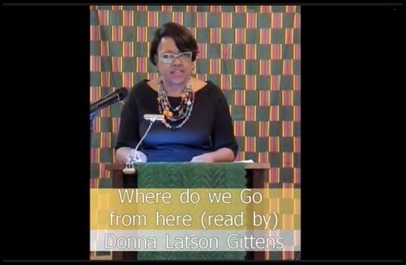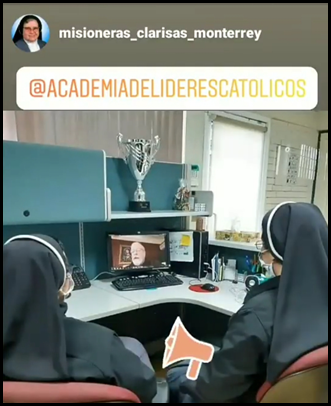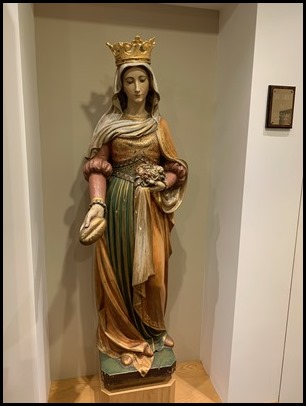Hello and welcome!
On Martin Luther King Jr. Day, ordinarily, I would have gone to St. Katharine Drexel Parish for their annual Prayer Breakfast to celebrate Dr. King’s legacy. This year, however, I was happy to join them online for their virtual celebration, which was hosted by the pastor, Father Oscar Pratt.
There were a small number of people at the parish itself though many more joined us via Zoom.
The program featured several readings from Dr. King’s works accompanied by powerful images, as well as a performance by Boston’s three Black Catholic Tenors: Meyer Chambers, Fred Van Ness and Byron Wratree.
The keynote speaker for this year’s celebration was Rev. June Cooper, Executive Director of Boston City Mission. She earned degrees from Newton College of the Sacred Heart and the Boston College School of Social Work before she went to the Protestant seminary, so she is very familiar with the Catholic Church. She gave a beautiful reflection on the meaning of Dr. Martin Luther King’s message for us today, and I enjoyed it very much.
Tuesday, I addressed an international conference on the distribution of coronavirus vaccines in Latin America. I had been approached by Dr. Enrique Segura, a board member of The Catholic University of America, with the invitation by Cardinal Aguiar of Mexico City and José Antonio Rosas of the Academia de Líderes Católicos de Latinoamérica (The Latin American Academy of Catholic Leaders), who were holding this conference. 
There were three speakers during the day, followed by a period of questions and answers.
I was asked to give a talk on the ethical aspects of the coronavirus vaccines — why we can and should be vaccinated.
Dr. Katarina Le Blanc, an immunologist from Switzerland who is a member of the Pontifical Academy of Sciences, gave a very interesting talk on the scientific background of the vaccines. We also heard from Enrique García Rodríguez, the former treasurer of the Inter-American Development Bank. He talked about the impact of the pandemic on the world economy, and particularly in Latin America, which is the area that has suffered the most economically because of the pandemic.
Wednesday was, of course, the inauguration of President Joe Biden and Vice President Kamala Harris, and I issued this statement for the occasion:
Today we offer our prayers and best wishes for President Joseph Biden and Vice President Kamala Harris as they undertake the important work of governing our nation. We ask God’s blessings on them for good health, wisdom in all their decisions and their work of building bridges of reconciliation.
We congratulate Vice President Harris on being inaugurated the first woman, first person of color and first Asian American to serve as Vice President.
We pray that President and Vice President enact policies that provide care for the forgotten and vulnerable, heal our nation from this deadly pandemic, welcome the immigrant, provide economic justice and opportunity for all, work to end systemic racism and promote peace across our country and throughout the world. We will endeavor to dialogue with the Biden Administration to advance our commitment to the protection of human life from conception to natural death.
Our nation is experiencing serious and troubling division. In addressing a Joint Session of Congress in 2015, Pope Francis spoke of “the disturbing social and political situation of the world today” and encouraged us to “move forward together, as one, in a renewed spirit of fraternity and solidarity, cooperating generously for the common good.” The Holy Father called us to “resolve to support one another, with respect for our differences and our convictions of conscience.” With the help of God and one another, may we strive for that unity of purpose.
Certainly, it was a day of many poignant moments. Among them was the invocation given by Father Leo Donovan, the former president of Georgetown University. It was a beautiful prayer, in which he recalled that Bishop John Carroll, the first Bishop of the United States, was invited to give the invocation at George Washington’s inauguration.
Gracious and merciful God, at this sacred time, we come before you in need, indeed on our knees.
But we come still more with hope and with our eyes raised anew to the vision of a more perfect union in our land, a union of all our citizens to promote the general welfare and secure the blessings of liberty to ourselves and our posterity.
We are a people of many races, creeds, and colors, national backgrounds, cultures, and styles, now far more numerous and our land much vaster than when Archbishop John Carroll wrote his prayer for the inauguration of George Washington 232 years ago.
Archbishop Carroll prayed that you, O Creator of All, would assist with your Holy Spirit of counsel and fortitude, the president of these United States, that his administration may be conducted in righteousness and be eminently useful to your people.’
Today we confess our past failures to live according to our vision of equality, inclusion and freedom for all.
Yet, we resolutely commit still more now to renewing the vision, to caring for one another in word and deed, especially the least fortunate among us, and so becoming a light for the world.
There is a power in each and every one of us that lives by turning to every other one of us — a thrust of the Spirit to cherish and care and stand by others and, above all, those most in need. It is called ‘love,’ and its path is to give ever more of itself.
Today it is called American patriotism, born not of power and privilege, but of care for the common good with malice toward none and with charity for all.
For our new president, we beg of you the wisdom Solomon sought when he knelt before you and prayed for an understanding heart ‘so that I can govern your people and know the difference between right and wrong.’
We trust in the counsel of the letter of James: “If any of you lacks wisdom, you should ask God who gives generously to all without finding fault, and it will be given to you.”
Pope Francis has reminded us how important it is to dream together. ‘By ourselves,’ he wrote, ‘we risk seeing mirages, things that are not there. Dreams, on the other hand, are built together.’
Be with us, Holy Mystery of Love, as we dream together.
Help us under our new president to reconcile the people of our land, restore our dream, and invest it with peace and justice and the joy that is the overflow of love.
To the glory of your name forever. Amen.
This week, we received word that Bishop Bill Fey, a Capuchin who studied with me in the seminary, died from the coronavirus.
They sent along this video of his episcopal ordination in Papua New Guinea that I want to share that with you.
On Thursday, I went to St. Elizabeth’s Medical Center to receive my second dose of the coronavirus vaccine. Dr. Joseph Weinstein, Chief Physician of the Steward Health Care Network, has been of great help to the archdiocese and the community at large in leading a response to the COVID public health crisis, we are blessed by his dedication to caring for others. 
While I was at St. Elizabeth’s I was pleased to be able to celebrate Mass in the hospital chapel, which was broadcast to all the hospital rooms through their closed-circuit television system. 
With James Terwilliger, President of St. Elizabeth’s; Deacon Elcio dos Santos, a surgical technician at St. Elizabeth’s and deacon at Immaculate Conception in Marlborough; St. Elizabeth’s Chaplain, Father Joseph Obinna Ogazie; and St. Elizabeth’s Director of Spiritual Care, Elizabeth Goeke
Health care has always been a very important ministry in the Church since the time of Christ, who devoted so much time to care for the sick. In the day’s Gospel, there were three mentions of the great crowds seeking out Jesus, and it was people taking their sick to him for healing. In my homily, I talked about how that ministry continues today through Catholic health care, and I noted that about one-quarter of the hospitals in the world — and over 60 percent in the developing world — are run by the Catholic Church.
I also spoke about the history of Catholic health care in the archdiocese and how the Sisters who originally founded the St. Elizabeth’s were Third Order Franciscan Sisters. 
The statue of St. Elizabeth in the Chapel
St. Elizabeth is the patroness of the Third Order of St. Francis. She was the queen of Hungary and used all of her wealth to serve the poor and became a Third Order Franciscan herself.
We are very grateful for the ministry that takes place in our hospitals, and during the Mass we prayed especially for the victims of the coronavirus and their loved ones. We prayed also for the first responders, medical personnel and those working in our hospitals to care for the sick.
Until next week,
Cardinal Seán
